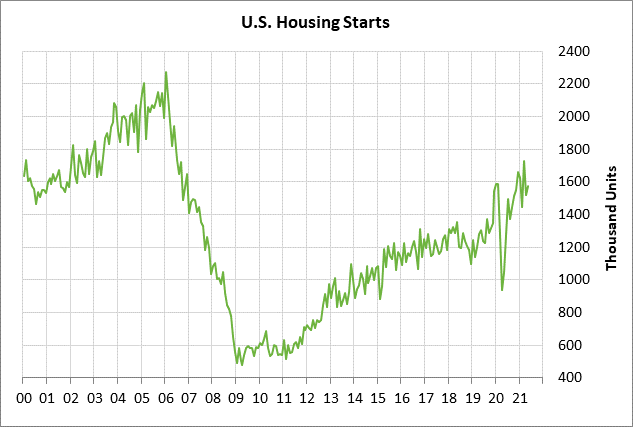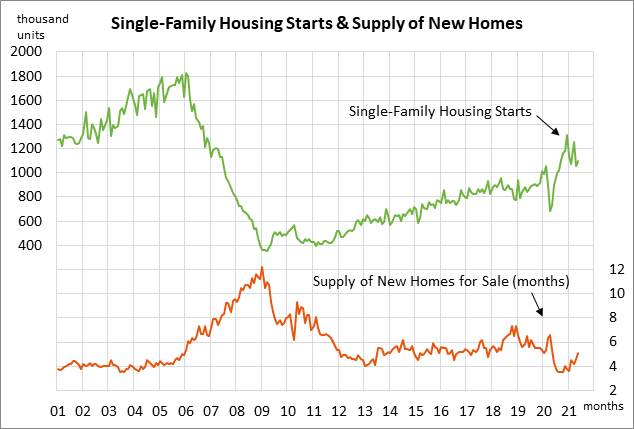- Stocks fall sharply as delta variant surges
- U.S. housing starts expected to edge higher
Stocks fall sharply as delta variant surges — The S&P 500 index on Monday fell sharply to a 1-month low and closed the day down -1.59%. The S&P 500 index has now corrected lower by a total of -3.7% from last Wednesday’s record high. Meanwhile, the Nasdaq 100 on Monday fell to a 3-week low, closed -0.90% lower on the day, and has corrected lower by a total of -3.6% from last Tuesday’s record high.
Stocks fell mainly on worries about the worldwide surge in Covid infections due to the delta variant, which is much more transmissible than the original version. There are fears about new and extended restrictions that would curb the global economic recovery.
The 7-day average of new U.S. Covid infections reached a new 2-month high of 34,190 on Saturday, which is more than triple the 16-month low of 11,351 posted about a month ago on June 23. On a single-day basis, the number of new Covid infections last Friday surged to a 3-month high of 78,572. The delta variant is spreading mainly among people who have not been vaccinated at all, which is 44% of the U.S. population, according to the CDC.
Vaccination rates have slowed substantially in recent weeks due to the reluctance of some people to get a vaccination. Also, vaccinations have still not been approved for young children. The slow vaccination rates, combined with the more transmissible delta variant, means that the U.S. will remain hobbled by the pandemic for at least a few more months, if not into next year.
Globally, the delta variant is wreaking havoc, particularly in countries that have low vaccination rates. Americans yesterday received a warning from the U.S. State Department not to travel to the UK due to higher infections, with the warning applying even to travelers who are fully vaccinated.
Travel stocks were particularly hard hit on Monday. Carnival Corp (CCL) and Norwegian Cruise Line Holdings (NCLH) closed down more than -5% on Monday, and Royal Caribbean Cruises Ltd (RCL) closed down more than -4%. Also, United Airlines Holdings (UAL) closed down more than -5% on Monday, and American Airlines (AAL) closed down more than -4%. Finally, and Delta Airlines (DAL) closed down more than -3%.
Stocks on Monday were also undercut by weakness in oil stocks that was caused by Sunday’s OPEC+ agreement to raise production and by concern that the delta variant will undercut global economic growth and oil demand. Aug WTI crude oil futures on Monday plunged by -7.15% to $66.42 per barrel.
Diamondback Energy (FANG) on Monday closed down more than -6%. Also, Marathon Oil (MRO) and Phillips 66 closed down more than -5%. In addition, Occidental Petroleum (OXY), Schlumberger (SLB), and Valero Energy (VLO) all closed down more than -4%.
Meanwhile, the bond market confirmed the worries about the delta variant. The 10-year T-note yield on Monday fell by -10 bp to 1.19% and posted a new 5-month low. The 10-year T-note yield has now plunged by a total of -58 bp from March’s 1-1/2 year high of 1.77%.
The recent pandemic surge has also caused the market to significantly dial back expectations for Fed tightening. For the horizon of the end of 2023, the market has drained 11 bp of Fed tightening out of expectations in just the last two weeks.
Specifically, the Dec 2023 federal funds futures contract on a yield basis has fallen by -11 bp to 0.69% from the 0.80% level seen last Tuesday. The current Dec 2023 federal funds rate level of 0.69% means the market is now expecting 59 bp of rate hikes by the end of Dec 2023 from the current effective federal funds rate of 0.10%.
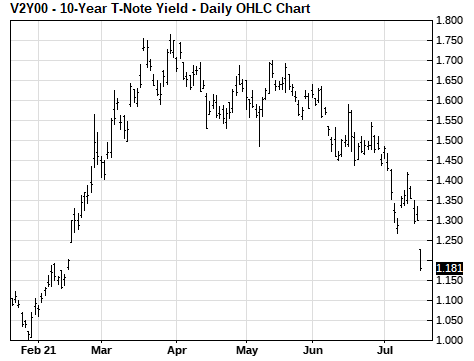
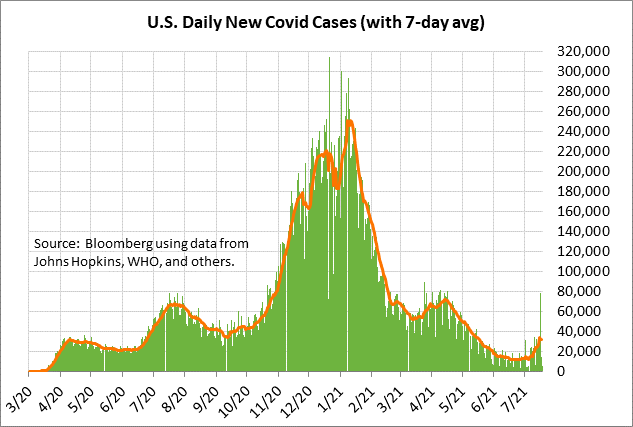

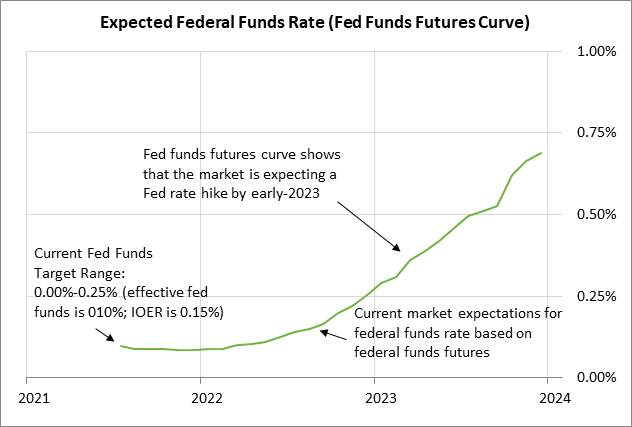
U.S. housing starts expected to edge higher — The consensus is for today’s June housing starts report to rise by +1.2% m/m to 1.590 million, adding to May’s increase of +3.6% m/m to 1.572 million.
U.S. housing starts remain in very strong shape at only 10% below the 15-year high of 1.725 million units posted in March. U.S. homebuilders remain very confident due to the strong demand for new homes, the tight supply of new homes on the market, and the recent decline in mortgage rates. The 30-year mortgage rate is currently at 2.88%, down by -30 bp from the 1-year high of 3.18% posted several months ago in early April.
The NAHB housing index yesterday fell by -1 point to 80, but that was still a very strong level that was only 10 points below the record high of 90 posted in November 2020. The report showed that U.S. homebuilders are still in a very good mood due to the positive housing environment, with strong demand and tight supplies. Another positive for homebuilders is the full reversal of the upward spike in lumber prices seen in April and May, which brought homebuilders’ lumber costs back to normal.
